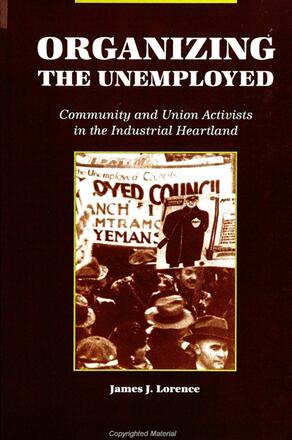
Organizing the Unemployed
Community and Union Activists in the Industrial Heartland
Alternative formats available from:
Examines the organization of the unemployed during the Great Depression and demonstrates the linkage between their mobilization and automobile-industry organization.
Description
Focusing on Michigan during the Great Depression, this book highlights the efforts of community organizers and activists in the United Automobile Workers (UAW) to mobilize the jobless for mass action. In doing so, it demonstrates the relationship between unemployed activism and the rise of industrial unionism. Moreover, by discussing Communist and Socialist initiatives on behalf of displaced workers, the book illuminates the impact of radicalism on social change and shows how political claims influenced the cultural discourse of the 1930s.
The book not only helps fill a void in our knowledge of community activism, worker culture, and labor history in the 1930s but also sheds light on the New Deal's domestication of American labor and the channeling of mass protest toward politically and socially acceptable goals. The UAW acceptance of responsibility for the underclass of the 1930s raises pertinent questions for labor in the 1990s.
James J. Lorence is Professor of History at University of Wisconsin Center--Marathon County. His other books include Gerald J. Boileau and the Progressive-Farmer-Labor Alliance and Organized Business and the Myth of the China Market: The American Asiatic Association, 1898-1937.
Reviews
"For years, labor and social historians have bemoaned the need for precisely this kind of study. Lorence's choice of a major industrial state, Michigan, which gave rise to the largest industrial union in the country, the UAW, is apt. Anyone interested in the Depression's history must buy this book. " --Asher, University of Connecticut
"The scholarship is extraordinary in its depth, ingenuity and balance. The unemployed organizing of the early 1930s has never received the scholarship due its importance. The book is enormously interesting to read and full of unexpected ramifications. It may be considered one of the most important on the Depression labor movement and milieu for some time. " -- Paul Buhle, Brown University
"Lorence's book has a number of strengths. It deals with an important topic, which allows the author to explore a variety of issues central to the literature on twentieth-century working class activism: the activities of the American Communist Party, its links to the Congress of Industrial Organizations and the United Automobile Workers, the relationship between those organizations and the New Deal welfare state. Lorence deals with these issues in a judicious and reasonable manner, and he has managed to uncover connections that the current literature does not make. All in all, it is an impressive piece of scholarship. " -- Kevin Boyle, University of Massachusetts--Amherst